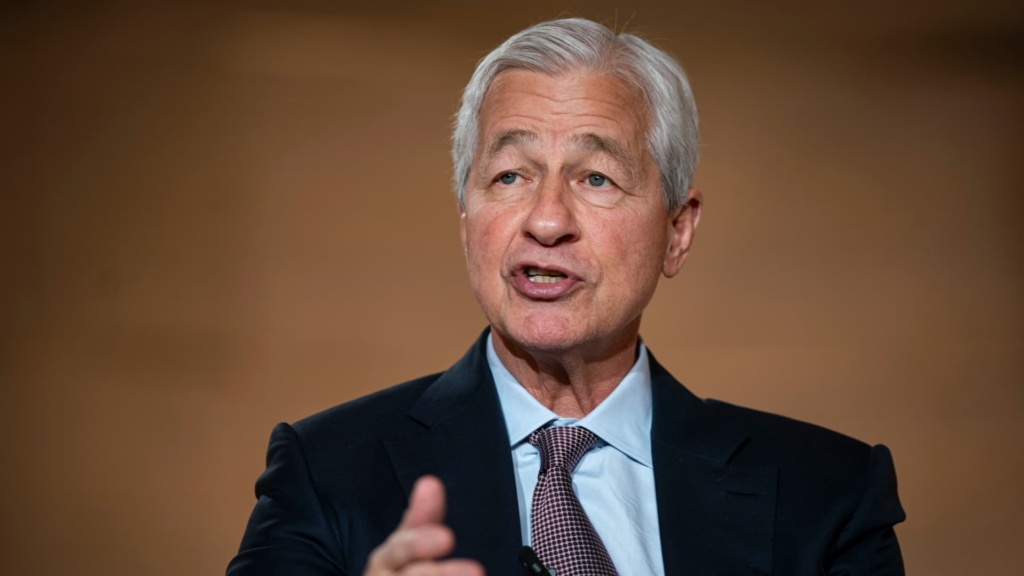In a statement on Monday, JPMorgan Chase CEO Jamie Dimon expressed concerns that tariffs recently introduced by President Donald Trump could lead to increased prices for both imported and domestic goods, thereby exacerbating the ongoing slowdown in the U.S. economy.
In his annual shareholder letter—often regarded as a critical analysis of economic conditions—Dimon addressed the tariffs announced on April 2, highlighting the potential short-term inflationary impacts they might have. His remarks come at a time when global financial markets have been reeling from Trump’s tariff policy announcements, marking one of the worst weeks for U.S. stocks since the COVID-19 pandemic began.
“No matter the justifications for these tariffs, there are likely significant short-term consequences,” Dimon noted. “We are likely to experience inflationary effects on both imported goods and domestic pricing, particularly as input costs rise and demand for domestic products grows.”
He also pointed out the uncertainty surrounding whether these tariffs would trigger a recession, stating that they would still likely impede economic growth.
Dimon is notably the first major Wall Street banking executive to publicly address the implications of Trump’s tariffs amid declining global markets. His previous statements had taken a more optimistic tone regarding tariffs, but recent market reactions seem to have shifted his perspective.
“The complexities and uncertainties caused by Trump’s tariff policies could impact corporate profits, influence global capital flows, and elicit varying responses from trading partners,” he explained. “Resolving these issues swiftly is crucial because any negative effects could accumulate over time and become difficult to reverse.”
‘Not so sure’
Despite the U.S. economy’s strong performance over the past few years, buoyed by significant government spending, Dimon indicated that the economy was already showing signs of weakness prior to the tariff announcements. He warned that inflation might persist longer than many anticipate, potentially keeping interest rates elevated during a time of economic slowdown.
“The economy currently faces substantial challenges encompassing geopolitical tensions, while the positive effects of tax reforms and deregulation compete with the negative impacts of tariffs and ongoing trade wars, along with persistent inflation and high fiscal deficits,” he remarked.
Dimon has expressed caution about the U.S. economy since at least 2022, when he warned of an impending “hurricane” due to the unwinding of Federal Reserve policies and the ongoing conflict in Ukraine. However, robust government and consumer spending had previously allowed the U.S. economy to outperform expectations until recent developments.
In his latest letter, Dimon conveyed a sense of foreboding regarding the declines in U.S. stock markets, suggesting that investors may still hold overly optimistic views about market stability. “Markets appear to be pricing assets as if we are headed for a soft landing, and I find that hard to accept,” he concluded.
‘Critical crossroads’
Over the course of nearly 20 years, Dimon has led JPMorgan to become the largest bank in the U.S. in terms of both assets and market value. He noted that last year marked the seventh consecutive year of record revenue for the institution.
However, Dimon underscored that the bank’s fortunes hinge on broader factors regarding the long-term health of America and the future of global democracy, which he described as being at a “critical crossroads.”
Although Dimon did not specifically mention Trump in his lengthy letter, he aligned with some of the administration’s key priorities, including immigration reform, addressing trade imbalances, particularly with China, and deregulation. Nonetheless, he advocated for meaningful reform and the preservation of the global order that has fostered peace and prosperity over the decades since World War II, stressing that abandoning this system would play into the hands of international adversaries.
“Our adversaries desire to undermine the extensive alliances that America and its allies have created,” Dimon warned. “The resulting multipolar world would be a dangerous environment where nations act solely in their self-interest, leaving adversaries to dictate terms through coercive tactics.”
To navigate these challenges, Dimon urged for a restoration of civic pride, a pragmatic approach to critical issues such as immigration and trade, and an unwavering commitment to maintaining a robust U.S. military presence.
“While ‘America First’ is a viable mantra, it must not lead to isolationism,” he asserted, emphasizing that strong economic foundations remain essential in a globally interconnected context.


























